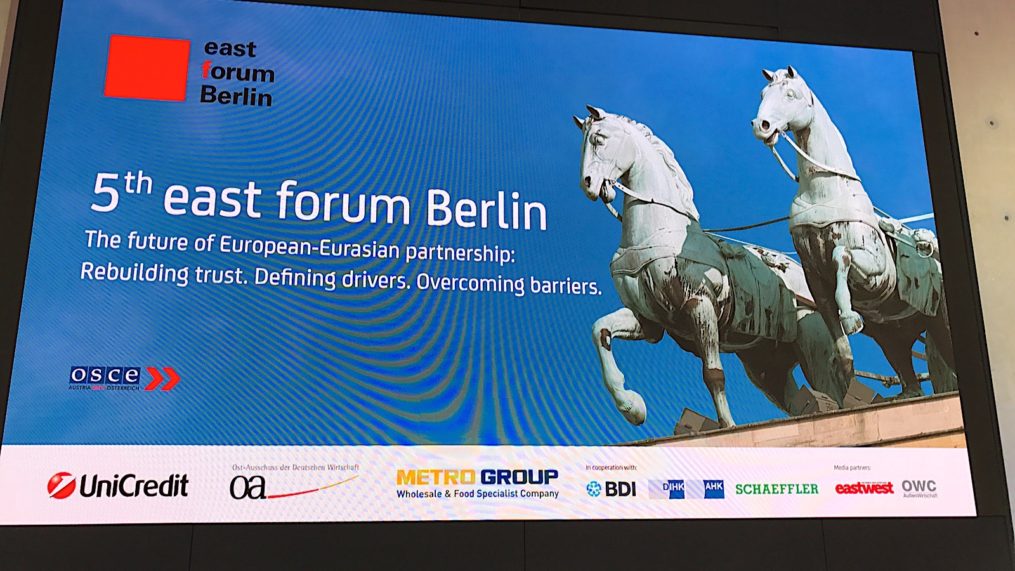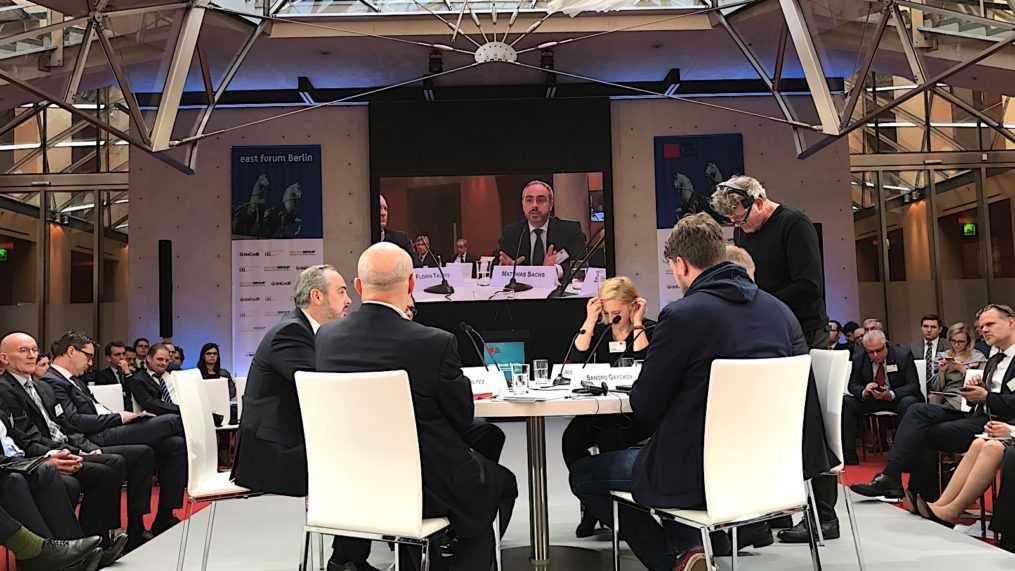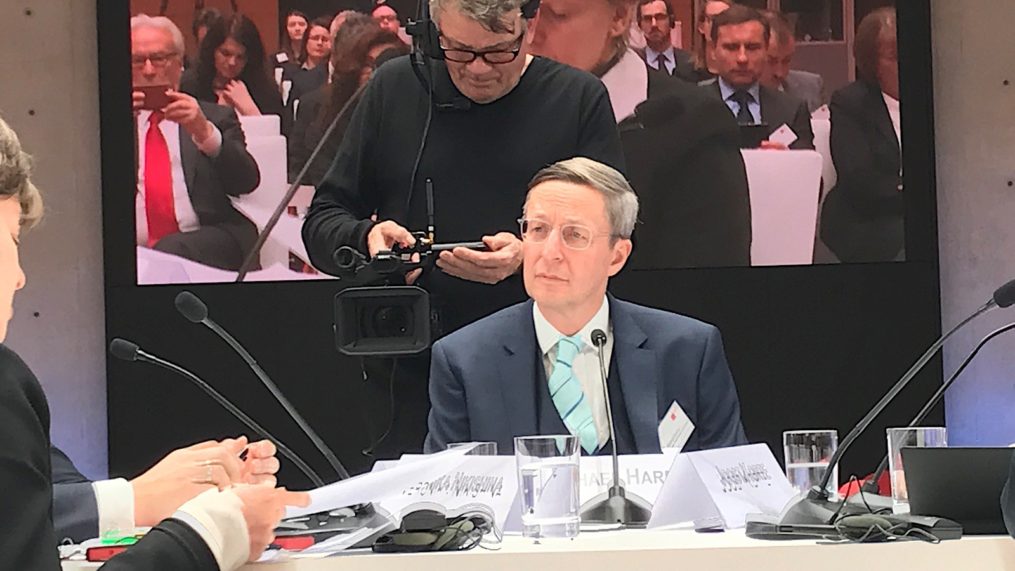POPULISM, PROTECTIONISM, ISOLATION: HOW TO STOP EUROPEAN DISINTEGRATION?
If we seriously want to look for a way out of the present multiple crises we should observe the following „rules“:
First, we should not deny conflicts, different attitude by different powers and political forces and multiple challenges. We have such antagonism and fractures inside the EU and the wider Europe.
Secondly, we should not interpret these differences as principle and insurmountable obstacles for pragmatic cooperation.
Third, we should learn from history and especially the overcoming of the risky stalemate during the Cold War which was in danger to become a Hot War several times.
Fourth, we have to look at the possibility to improve the situation by taking into account the economic, social, military, cultural and emotional aspects. Information and rational arguments alone would not be enough to convince people and especially politicians to overcome their resistance to think in new terms without always seeing dangers and enemies.

1957 – sixty years before and 60 years after
When we compare the last sixty years – after the conclusion of the Treaty of Rome with the sixty years before the difference is enormous. Sixty years peace inside the EU and its member countries with overall long-term economic and social progress on the one side against two world wars and disastrous economic depression and high unemployment without adequate social support on the other side.
But if we look to the last ten years many citizens recognize an economic crisis with an unacceptable high unemployment and realize many disappointments in relation to the promises by pro-European forces and their own expectations. And a new confrontation between the EU and some of its neighbors with Russia has established a frozen relationship which some call a New Cold War.
External threats and internal cohesion
The economic crisis and the conflict with Russia was not without consequences for the internal cohesion of the EU. To some differences between the „old“ member countries and the new ones – joining after 2004 – were added differences between countries fearing Russian interventions – especially Poland and Baltic countries – and those who feared and even rejected a confrontation with Russia.
And the economic crisis had a strong effect on the relationship between „northern“ and „southern“ Euro countries. Two different philosophies how to manage economic developments and social relationships were confronting each other. But very often these fundamentally different approaches were not realized.
In addition the EU and especially some member countries were and are challenged by an increased refugee influx. Also here we can recognize different approaches how to react to this challenge – externally concerning migration and internally concerning integration. The fact is, that few countries take the majority of refugees and that Islam became in many countries a symbol of threat and danger.
Reforms for sunny days without preparations to manage crises.
In both cases – the challenge to stabiles the Euro in a cohesive way and to manage the challenges from migration and integration – the EU is victim of half-baken reforms and institutions. Both, the Eurozone and the Schengenzone have been constructed for „sunny days“ but not for crisis situations. Both zones need more stronger institutions and regulations to protect the interest of all members and create mechanisms of acceptable mutual support.
A balance between cohesion, borders and openness
Communities like the EU but also the countries concluding special communities inside the EU like the Eurozone and the Schengenzone need a balance between cohesion, borders and openness. This balance is disturbed and that is the reason for many crisis and challenges.

The cohesion inside the EU and particularly inside the Euro area has not reached the necessary level for longer term stability. Concerning the EU this leads to questioning the freedom of movement for labour – at least in some member countries. Concerning the Eurozone some members – especially Greece feels itself under undue pressure and others like Germany, Netherlands feel themselves as being misused by reform unwilling member countries.
The economic and social reasons for rising populism
In general of course the high unemployment – especially of young people in many member countries – and the rising inequality are the main contributors to rising dissatisfaction and voting for authoritarian and populist parties and politicians.
But it is not only a matter of facts, it is a question of impressions and emotions. Now you may call some reactions like the Brexit decision and some voting patterns irrational but they do exist and are not only based on facts.
As the EU always was interpreting the economic success as being achieved because of the openness of its economies and its support for free trade this openness and especially trade policies came under attack. Here left and right wing meet each other in rejecting free trade and argue for different levels of protectionism and isolation.
Diversity versus – narrowly interpreted – identity
For some politicians and political forces the reason for disappointment and failure was not – or not only connected with the economic openness like international competition and free trade but with the openness of society in respect of cultural, ethnic, religious and gender aspects.
We see today a growing longing for identity and differentiation and rejecting cultural and religious diversity but also political correctness.
In respect to this question Russia is bringing itself into the debate. It openly supports forces in EU countries but also beyond which are attacking these liberal values and defends the conservative values of traditional and closed societies.
Interestingly China – until now – is rather concentrated on economic issues and with all its authoritarian domestic policies is refraining from interfering into internal political issues. They do not want to impose a cultural/political system but trade – according to Chinese interpretation of globalization.
Maybe we need China to counterbalance sometimes Russian policies. It is not about who is morally more acceptable it is necessary to implement our European aims and targets.
EU under attack and challenged
Europe in the meaning of the European Union has to manage different internal divisions and outside challenges. In addition to migration and challenges from Russia it has now also to grapple with a new US policies which is openly critical of the EU.
What should Europe do to manage these challenges and to work against the danger of dissolution of the EU and the disintegration of Europe?
Success as basis for reform and reorientation
The EU should first recognize that – in spite of the crises and challenges of the last ten years – the European project was and is a huge success. No political entity could enlarge itself and its influence in the last 60 years.
In spite of colonialism and the self-destructing two world wars Europe gained as an economic and value based community world wide respect. The enlargement was the consequence of that political and moral appeal. And the whole Europe benefitted from that extension.
The limits of the EU in speaking for Europe
But the EU must recognize that – at least for a long term if ever – it cannot organize all Europe and extend its membership to all European countries. It will not be able to offer itself for all countries as role model. At least it will have some setbacks. Even inside the EU it is not able to implement its values all the time and in all member countries.
It will have to mix pragmatism with support for universal values if it wants to continue to play an important global role. The same is true for NATO.
Both have to recognize that they will not be able to cover all Europe. But European stability and security for its citizens is depending on the cooperation and contributions of all European countries.
From a moral position – seen by the European heritage including different revolutions against authoritarian governments and recent development- individual freedom and democratic procedures and contents should always have priority over power issues and influence zones. But one cannot impose this ranking on others like a teacher is enforcing mathematical rules to the pupils.
The crucial role of security
Security remains also an issue of national interest and of course this is true for trade as well. The main argument is about how to fight for military and economic security and interests. The „new“ concepts going back to old patterns is promoting protectionism and isolation.
But experience of the past developments in Europe should lead to a policy of promoting one’s interests in multinational and cooperative agreements. It is not about giving up representing one’s interests but to include them in multinational treaties.
A European peace structure must not mean to abolish NATO but should lead to a strong cooperation with Russia and other non-NATO countries in Europe. Already with Turkey today we see many ideological and value differences. Is somebody seriously thinking about asking Turkey to leave NATO?
Now I know that the annexation of the Crimea and the military intervention in Eastern Ukraine are events blocking the cooperation between the EU and Russia. And we should not forget the breach of international law even if Russia is by far not the only power who has done so.
But let’s look to the way of European and specially German unification. Not by cutting links and contacts but by different forms of connectivity could we change the status quo. Yes it needed time. But time we will need anyway to solve this conflict.
Economic connectivity
To promote the economic influence must not mean to impose on everybody the – anyway only partially successful – European model but to find common ways of promoting trade and connectivity – even beyond lines of crisis and conflict.
If Europe wants to promote some of the universal values it is so proud of, it should promote them by proposing a European security system comprising all European countries.
And so it should promote a common Free Trade Zone and also a development policy and development partnerships which in the long run may be even more successful than short term pressure to adopt the European model of doing things properly.
Involve citizens into a new pragmatic strategy
Between neglecting the people who feel to be left alone or being not included into economic progress on the one hand and promising them to find solutions in isolation and protectionism on the other hand Europe has to find an alternative way.

The EU and national governments must express serious respect for individuals who feel excluded and find realistic solutions inside multilateral agreements. But they should refrain from easy „answers“ which must fail.
They must find multinational ways and instruments to better take into account the interests of those who are not on the winning side and they have to establish methods of national compensations.
Involving citizens and civil society in implementing reforms and changes does not mean that politics should refrain from decision, not it is about giving decision a stronger democratic legitimacy.
Interrelationship of economic and military security
The EU has to learn to adapt to new realities of a multi-polar world where countries use different – economic and military – assets and different value frames to promote their power.
This should not lead to cultural relativism and acceptance of all means of politics to regain zones of influence. But it must lead to pragmatism, dialogue and long term strategies. Also the cultural dialogue must be continued or may need even a new start.
Insecurity leads always to nationalism, isolationism and protectionism. On the other hand economic connectivity and mutual dependence can lead to higher security. So we have to develop a strategy where we do not give up our values but we have to try to find ways fulfilling the expectations and desires of our citizens in new forms of constructions.
Like in everyday life our relationship cannot rely only (!) on the basis of values. We have to develop also dialogue with people and forces with whom we do not share the same values but some of the interests.
And like in the Cold War we have to sometimes accept the interim status quo before we can find a solution which is acceptable to all sides. The EU/West, the US, Russia and China should in the interests of their citizens come forward with a pragmatic way of protecting their interests from war including economic wars.
